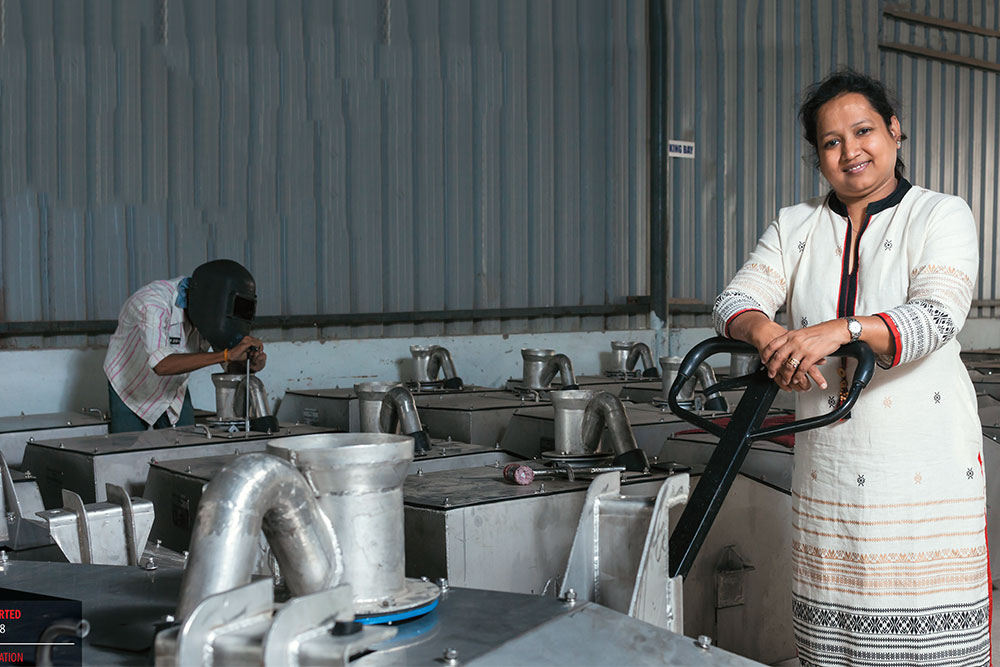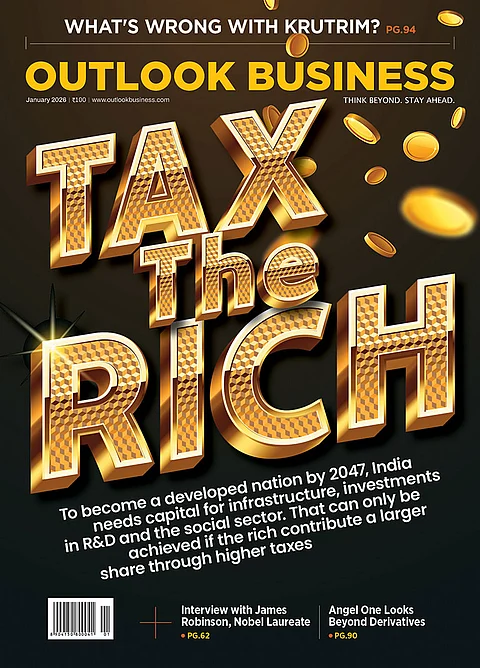As 40 workers put together metal plates, fix screws and tighten bolts in tandem, loud bangs and the screech of cutting metal is enough to drown out almost every sound. Namita Banka raises her voice to be heard over the din of the factory behind her. “Log sochte hain ki bathroom ka matlab gandagi aur badboo hai (people think bathrooms mean dirt and stench),” says the 41-year-old founder of Banka Bioloo. “We are trying to show them this is not always the case.”
The statistics are alarming. The United Nations estimates that over 1 billion people across the world defecate in the open, a global sanitation crisis that is most severe in India. Various studies estimate that around 594 million, that is, roughly one in two Indians, do their daily business in the great outdoors, without access to clean, hygienic sanitation facilities. Where rudimentary toilets do exist, they don’t have proper systems of waste disposal, leading to clogged sewers. It’s a dirty business, one most people would prefer to look away from, literally.
Banka decided not to close her eyes to the problem. Her six-year-old company makes e-loos that are cheap and easy to install and use bio-toilets that provide a hygienic solution to human waste disposal. “We focus on giving sanitation solutions to those who do not have access to toilets as well as those who have toilets but are facing trouble managing the waste,” Banka explains. With large institutional clients such as Indian Railways, Larsen & Toubro, various schools and colleges and village panchayats, the company, which earned ₹5 crore last year, has so far installed around 1,150 bio-toilets across India. The aim: to sell another 1,200 by the end of 2014 and cross revenue of ₹12 crore in FY15.
Cleaning things up
Moving to Hyderabad in 2008 when her husband’s work brought them to the city, Banka decided to step away from the jewellery business she had been running in Bengaluru and Surat to do something challenging for the environment and India’s poor. She completed a course in NGO management and started Banka Enterprises in 2008, investing ₹10 lakh from her savings. The company was a service agent for OEMs of controlled discharge toilet systems (CDTS). As the name suggests, CDTS retain waste matter and discharge it only when a preprogrammed number of flush cycles has been completed.
That’s when Banka came to know about the Defence Research & Development Organisation’s (DRDO) bio-digester technology for human waste management. Originally developed to decompose biological waste generated by soldiers in inaccessible, extreme temperature regions such as the Siachen glacier, DRDO later customised it for civilian use and offered the technology for commercial use. In 2011, Banka became the first entrepreneur to get a licence to commercialise the technology as bio-toilets. The following year, she and her family invested ₹70 lakh in the company and renamed it Banka Bioloo.
So, what are bio-toilets? These are regular toilet structures, with one essential difference: they have attached bio-digesters, tanks that degrade the human waste on-site in an odourless process using anaerobic bacteria (a combination of different groups of bacteria that help in decomposing cow dung and human excreta). The waste matter is converted into biogas, which can be used as fuel or safely released into the atmosphere, and water, which can be used for irrigation. The bio-digesters are usually built next to the toilet and can be customised in terms of size, shape and material to hold anywhere from 5,000 to 500,000 litre of degradable human waste. “Bio-toilets can be used anywhere — as mobile toilets, in rural housing, remote locations — where no sewer lines are available. They can function under any climatic conditions, from -55 to 60 degrees Celsius. Moreover, the flushing system uses just 1.5 litre water,” says Banka. It takes less than a day to set up a bio-toilet.
A big job
Licence in hand, Banka started off by targeting infrastructure companies, which require portable loos for construction projects. “As a start-up, we needed to quickly generate revenue to sustain ourselves. This was the fastest way,” she explains. While working with clients such as Larsen & Toubro, Shapoorji Pallonji and the Tata Group, she came to know that the Indian Railways was looking for CDTS vendors. “The people who travel on Indian Railways are all open defecators in a way because the railways use the drop chute system, where the waste is directly discharged onto the tracks,” says Banka. Over the past few years, though, the railways has been working to replace that with a more hygienic and environment-friendly system — not least because the tracks were getting corroded because of constant contact with human waste.
Banka was quick to see the opportunity. “There are more than 50,000 coaches running every day all over the country,” she points out. “There are very strict guidelines and rules that we complied with before bidding for the tender when it was floated. Eventually we bagged the contract to become one of the railways’ many vendors of bio-toilets.” Of the 11,700 bio-digesters Indian Railways has installed till June 2014 from various companies, including the Jindal Group and Omax Autos, Banka Bioloo accounts for 700.
The bio-digesters Banka Bioloo has installed in railway coaches are metal structures fitted under the coach floor below the lavatories. The ₹80,000-1 lakh the company charges for each bio-digester includes an annual maintenance and operational contract as well, which involves daily checks and replenishing the bacteria when required. Currently, Banka Bioloo supplies 80-100 bio-digesters to Indian Railways every six weeks, accounting for 70% of its revenue. With the railways planning to replace direct discharge toilets with bio-toilets across its entire fleet by 2021-22, and less than 3,000 coaches converted so far, there’s an enormous opportunity waiting to be tapped. Not surprisingly, Banka is comfortable with competition. “For a problem this large, we must all work together and help improve sanitation conditions in India,” she says.
The daily dump
It was common practice for residents of Shahapur town’s ward 7, Chamundeshwari Nagar, to fill a bottle or can with water from a hand pump and then head into open land to relieve themselves. Town municipal corporation member Santosh Basanna says the situation was particularly difficult for women. “We had been speaking to the government for a long time but nothing was taking shape. Then, six months ago, bio-toilets were installed in our ward, and now hardly anyone defecates in the open,” he adds. Under an MLA grant, Banka Bioloo installed four bio-toilets at Chamundeshwari Nagar, which are run as public toilets by the municipal corporation and used by over 500 people every day.
Unlike in the case of the railways, where Banka Bioloo only supplies the bio-digesters, in rural areas, the company constructs the entire toilet — a superstructure made of RCC cement housing the toilet that is connected to the bio-digester. Priced between ₹20,000 and ₹40,000, these fibre reinforced plastic (FRC) structures are manufactured at a second facility in Cherlapally, where 10 workers churn out 100 pieces every month.
Now, Banka Bioloo is looking for cheaper, customisable ideas — a design incubation centre with four engineers is working on cost-effective designs and solutions for mass installation of bio-toilets in rural areas. By the end of this year, Banka wants the complete solutions vertical to bring in at least half the company’s revenue. “Our aim is to find sanitation solutions that can sustain for years. And when I say sustain, I mean the concept, not just the superstructures,” she says. So far, 150 bio-toilets have been installed in villages in Karnataka, Telangana and northeast India. In most cases, the loos have been bought by village panchayats for public use. However, NGOs such as Engineers Without Borders, companies for CSR programmes and on-site use, and a few individuals have also come forward.
Vijaya Sharada Reddy, whose Holy Mary group runs several educational institutes in and around Guntur and Hyderabad, says installing bio-toilets has reduced the nuisance of having to clean or redirect human waste. “This solution is especially practical in rural areas because bio-digesters are cheaper than septic tanks and the residual water can be used for the trees and plants on our campuses,” she explains. Banka Bioloo has installed a large bio-digester with a capacity of holding 27,000 litre at the group’s residential girls’ campus in Guntur, impacting 600 users, at a total cost of around ₹4.5 lakh.
Divyatanay Jordar, head of the Hyderabad chapter of Engineers Without Borders, points out that since January 2014, the NGO has installed over 25 bio-digesters from Banka Bioloo in Telangana’s Rudraram village for a cost of ₹5 lakh. Now, Jordar is working on Mission 2025, where he plans to use this technology to reduce pollution in the Ganga river. According to United Nations data, every minute, 1.1 million litre of human excrement enters the river. Jordar adds that 70% of sewage in the river comes from households. “So, we are working on a process to install bio-digesters in households, which will be two-thirds the cost of a septic tank,” he says.
That is great news for Banka, who has faced her share of challenges to get to this stage. “This was a new concept when I started out and there were very few people to fall back on. Making mistakes and learning from experience has been an integral part of my journey,” she says philosophically. Banka is less sanguine about the biggest hurdle she faces now — hiring managers. “Work related to toilets and cleaning human waste is not attractive to most people. Now that people have seen the impact of our work, it’s become easier to hire staff. But there’s still a long way to go,” she says.











